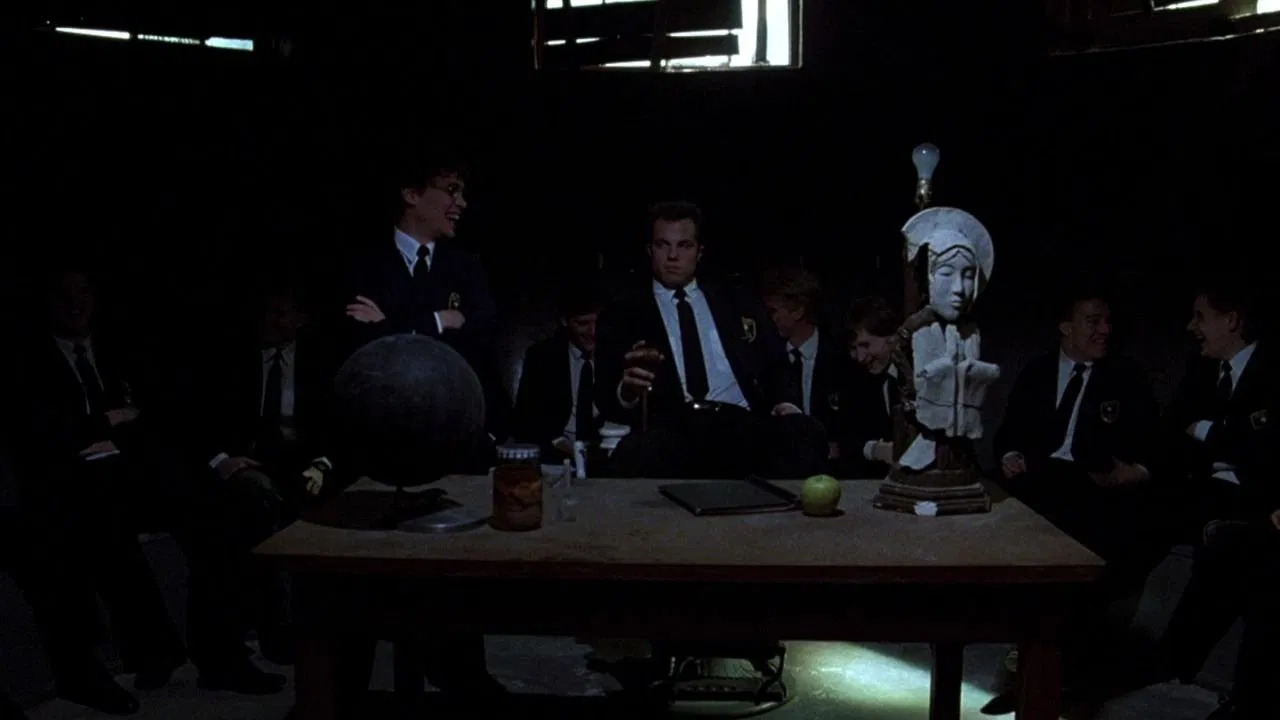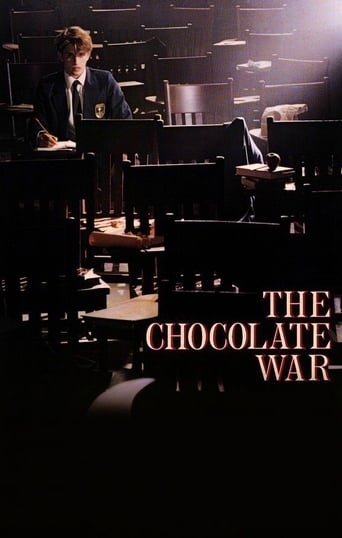

Good concept, poorly executed.
... View MoreAbsolutely the worst movie.
... View MoreIt's hard to see any effort in the film. There's no comedy to speak of, no real drama and, worst of all.
... View MoreJust intense enough to provide a much-needed diversion, just lightweight enough to make you forget about it soon after it’s over. It’s not exactly “good,” per se, but it does what it sets out to do in terms of putting us on edge, which makes it … successful?
... View MoreThe movie made the book look terrible because The man who played Archie did not show the evil side and Brother Leon was not as good as he was portrayed in the book. The ending was changed and I do not think that it was as good as the ending in the book. Because the ending in the book is how life is sometimes and it really showed how a Catholic school can turn. I liked the original Ending better than the movie's ending because Archie showed how he really was. By the ending it showed that he thought he was god. He always said "I am Archie" after saying something that related to how he could do anything. And it forgot an important part where Archie implied that he does not believe in god. The Assigning of Obie was just terrible, I thought that Obie would hate to do that.
... View MoreI was excited when I happened to catch The Chocolate War on TV a few years back. I had read the book and loved it, so was interested to see whether the film version would live up to the novel. For the most part, it was pretty good, but I was disappointed that the ending had been changed significantly from the book. The film's conclusion, in my opinion, lacks the punch of the original and wimps out by giving Jerry a happier (if not exactly happy) ending. The conclusion is why I love Robert Cormier's novel so much. It was the antithesis of a happy, Hollywood ending in every conceivable way--the bad guy wins, the good guy wishes he had given up. I found the brutal honesty refreshing. It's not so much that the film gives the good guy a happy ending, although it does leave him infinitely better off than the novel, but that it gives the bad guy the punishment he deserves. I feel the conclusion was the most important part of the story, and the changes in the film make it feel anti-climactic and fall flat.
... View MoreI went into this film expecting yet another inspirational story about an individual triumphing over the oppressive system. Instead, this film is a lot deeper than that... and a lot darker. It is at once a film about the horror of conformity and the deadening pointlessness of resistence. Our young protagonist, Renault, still agonizing over the death of his mother, is given a right-of-passage style task by his school's secret society, run by the calculating and elagantly power-hungry Archie : To refuse to sell chocolates to boost school income for 10 days (an activity Brother Leon, the equally power-hungry John Glover, is pushing on the students with unexpected zeal). But when his ten days are up, he still refuses to bend to the will of a system that wants only to use him as a tool. Both Archie and Brother Leon then use every method in their power to keep this rebel without a cause from toppeling them from power.Simple enough, but this, as I said, is not a simple film about fighting the powers that be. The protagonist actually has little to say about his own action: he's so opaque that it seems even HE doesnt know exactly what he's rebelling against, just that he can't give up. He doesnt really know what he's doing, and as his life is made more and more awful by Archie and Brother Leon, it becomes increasingly clear he doesn't enjoy it either. He simply feels compelled to, and stoically refuses to give in, despite the obvious pointlessness of his rebellion and the cruel consequences that ensue. But this makes for a very hard hero to identify with and root for. In fact, most of the film revolves around Archie and his attempt to break Renault's will. Archie is very talkative, and in fact the camera seems oddly attracted to his mercilessness, elegance and charisma, even as we assume we're supposed to revile him. Even creepy John Glover plays his villain very straight, giving only a vague, intangible sense of menace. By creating a hero we can't understand and villians we gravitate towards, the film subtly creates a situation where we can't really take sides, and can only observe the pathetic hopelessness of both situations. After all, this is all about selling CHOCOLATES. This throws the entire proceedings into an almost absurdist light. Light touches of humor (including a brief but spot-on perfect cameo by "Harold and Maude"'s Bud Cort) reinforce this classification and keep the proceedings from ever becoming bogged down in their gloominess.All in all, though, The Chocolate War is a very dark, slightly surreal tale of the emptiness of life, for winners or losers. It suggests that, fight the system or succeed with it, you're still just a tool of larger forces, unflinchingly puppeteering smaller lives for their own banal ends. It offers no solutions and no salvations, not for anyone. Just hubris and humiliation, and perhaps a grim chuckle or two along the way. Its this demenor that makes it a truly overlooked and rather unique cinema gem, well - worth some time and thought.
... View MoreThis film was not along the same lines as the ordinary (David conquers Goliath) high school film of the 80's. And for that respect was probably appreciated by anyone who had experiences of being bullied when they were growing up. Though it has been said that the film was not as good as the actual book, I think the adaption made its point and the lesson was learned. Many of the young people in this world who are fornunate enough to see it, even if by accident, will understand that they are not alone. There are others who are having an even harder time as they grow up, and that "their own life" isn't so bad after all !!!
... View More